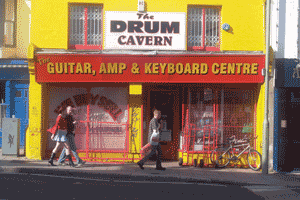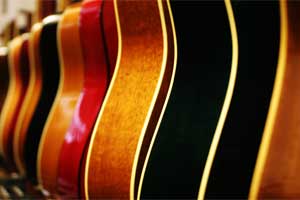If you truly want to enjoy your job as a teacher you have to have a strong network of people around you that look out for each others interests. In a school setting we think of this as being other teachers, our administrators, and in some cases extending out to our students and parental organizations. There is another group of people out there that are also working hard to make sure you succeed. They may not be directly tied to your school or your ensembles, but their success is directly tied to your success. Those people are the music retailers and shop owners in our communities that provide us with the music, supplies, instruments, and specialized services that are a vital part of making music in both public and private school and they can help you in many ways you may not have been aware of.
Retail stores come in all shapes and sizes from small mom and pop shops to huge, multi store chains with dozens or even hundreds of stores. Regardless of the size of the store, chances are very good that the store in or near your community can make your job as a teacher a whole lot easier.
Most music teachers think of their local music store solely as a place to get repairs, order music, or get bids on instrument purchases, but many established music retailers take things up a notch by providing sales reps that are specifically assigned to your school and your programs. If you make use of their services over time the store begins to know your program and your program's needs almost as good as you do. In addition, many sales reps provide other assistance and benefits that extend beyond the showroom floor. Conveniences such as providing free pickup and delivery of instruments and other supplies save teachers tons of time and effort, not to mention fuel or shipping costs. Plus, most stores also offer teachers the same discounts that they offer to the schools themselves saving you money on personal purchases. While these features are the bread and butter of many music stores there are many more reasons that a teacher should try to get to know your local store and your school's specific sales representative.
Partners In Success
 A smart music teacher should look at their local music store not simply as a place to purchase supplies, but also as a partner in their success as a teacher. A good music sales rep will have your best interests at heart, knowing that it is only through your success that they too can be prosper. Anjen Shah, the director of marketing at Music and Arts says that they "look at our relationship with the educator as a partnership. We work shoulder to shoulder with them to make sure they have a successful program." Having a good relationship with a vendor can actually make your job as a teacher less stressful by cutting out some of the tedious logistical tasks associated with your job.
A smart music teacher should look at their local music store not simply as a place to purchase supplies, but also as a partner in their success as a teacher. A good music sales rep will have your best interests at heart, knowing that it is only through your success that they too can be prosper. Anjen Shah, the director of marketing at Music and Arts says that they "look at our relationship with the educator as a partnership. We work shoulder to shoulder with them to make sure they have a successful program." Having a good relationship with a vendor can actually make your job as a teacher less stressful by cutting out some of the tedious logistical tasks associated with your job.
A good music store may grow to know your program's needs as well as you do over time, especially if they have a strong road rep staff that goes out to visit the individual schools in your area. For new teachers or for teachers starting a new job at a different school, getting to know your local retailers can be beneficial to your program in ways that you may not be aware of.
While the staff at any given school may change from year to year it is a safe bet that the local music store's representatives already have a handle on what your needs may be. They come to know what kind of reeds you want your students to use, the lesson books that you teach from, and even the preferences on which instrument brands that you would like your students to purchase. By asking the student to deal with the music store for these kind of purchases you also save yourself the hassle of dealing with large resale accounts and remove yourself from having to micromanage these and similar financial issues. "We want to help by handling all the details of dealing with instrument rentals, purchasing school equipment, music, and everything else that you need for your program," says Shah. In other words, all of the things that take away from the job of teaching and inspiring students. We position ourselves to take the administrative hassles off a teacher's plate, allowing them to focus on taking their students to the next level."
A Music Store's Role In The Community
Your local music stores play a larger role in music education than simply selling equipment and supplies however. Judy Pine, vice president and director of general music at West Music Company says that many stores such as hers expand on the basic needs of a student to provide more advanced services that directly benefit music education. "Our retail stores provide lessons and music related classes for people from young children to older adults. We even offer early childhood music classes for pre-K and younger kids. We also provide guitar and ukulele classes at some locations as well as keyboard classes for adults. It's not just for the fourth grader who wants to play a trumpet."
Some stores don't stop with lessons either. Says Pine, "We have thirteen music therapists that work through our stores, going out to schools and nursing homes to provide specialized services." Many stores also contribute to the music community by sponsoring educational workshops and seminars at state and regional events. "At state conventions we work to sponsor specific presenters in areas that are important to our customers. NAfME and other organizations like them depend on help from local music businesses to support their activities."
Other stores provide additional services that can help you get your programs, especially instrumental music, off on the right foot each fall. Shah points out that many stores provide special student recruitment materials such as posters that can be used to help get students interested in joining the band or advocacy materials that you can provide to your student's parents and others in your community. "We also work to bring artists into the schools to work with students." Some stores occasionally send out their lesson teachers to provide in school clinics and master classes or even to help work with the marching band during camp season or work with sectionals at important times during the school year.
The Bottom Line
There is a simple, overriding fact that applies almost universally to both brick and mortar music stores as well as online retailers. Their primary reason for existing is to sell you the goods you need to teach your classes. In this age of online shopping it's often easier just to point and click to get what you need, but here again, the benefits of using local retailers can offset any perceived online savings. Consider the fact that buying through a local retailer makes the purchase and return process much easier and more convenient. In most cases you won't have to pay shipping charges and your road rep may even deliver the materials right to your classroom. Also keep in mind that many local music stores now have online catalogs of their own, and many of these stores will provide you as a teacher with special codes that grant can grant you the same discounts online that you might receive in the store.
Of course, no local store can be perfect. Sometimes an individual store may not stock an extensive selection of sheet music or specific products, and in some cases the store's prices may be substantially higher than the same item found online, however in most cases the extra benefits provided through the store like repair and loaner services for instruments or leasing and maintenance agreements for school instruments often balance things out over the long run. Says Shah, "The ideal relationship is that of a partner rather than that of just a person to buy stuff from. They [the teacher] got into music for a reason. Most music educators want to impart a passion for music on their students and we want to help them. That way they can focus on being the musical CEO for their school and we can focus on operations."
Author's Note: An edited version of this article originally appeared in the October 2013 issue of Teaching Music Magazine (Volume 21, Number 2). It is reposted here by the original author with permission from NAfME.

